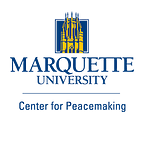Journalist Visits Marquette for Latin American Symposium
Gene Palumbo, a freelance journalist based in El Salvador, was invited by the Center for Peacemaking to take part in a two-day symposium (October 27–28) at Marquette entitled “What was achieved: Migration, Impunity, and Social Justice after the peace accords in El Salvador and Guatemala.” The event brought together peacemakers and distinguished guests from around the globe to discuss their perspectives on the conflicts in those two countries.
During his visit to Marquette, Palumbo also visited several classes and spoke about his experiences covering the civil war in El Salvador (1980–1992).
His own introduction to the issue of peacemaking came in the 60s. After graduating from Amherst College in 1964, he went to Baghdad, Iraq as a lay missionary, teaching and coaching at a Jesuit high school there. When he returned to the United States to begin graduate studies in philosophy at Fordham, he found the country divided by the war in Vietnam, and felt he had to make a decision about where he stood. “I spent almost a year thinking it through,” he said. “I ended up believing in the kind of non-violence that Gandhi and Martin Luther King stood for, so I filed as a conscientious objector. I’d say that refusing to make war is one way of making peace.”
After doing his two years of alternative service at a social work office in Harlem, Palumbo worked in the 70s as a journalist and at Mobilization for Youth Legal Services, a branch of the national anti-poverty program.
“We had storefront offices in poor neighborhoods on the Lower East Side of New York City. We fought slum landlords who tried to evict people, and government officials who tried to cut off their food and health care benefits. We did that by going into the courts and bringing lawsuits on behalf of the people,” said Palumbo.
In 1979 he went to Puebla, Mexico to cover a landmark two-and-a-half-week meeting of Latin American bishops. There he met Oscar Romero, the San Salvador archbishop who would be assassinated a year later, and who was recently beatified. Denouncing the injustices his people were suffering under a military dictatorship, Romero called for structural changes. A guerrilla movement was rapidly gaining strength in the country, but Romero, committed to nonviolence, insisted that taking up arms against the government was not the right way to bring about change.
Palumbo went to El Salvador as a journalist in early 1980, and ended up staying on. He has covered the civil war, which ended in 1992, and the postwar period. He has reported for the New York Times, National Public Radio, Commonweal Magazine, the Christian Science Monitor, and Time Magazine, among others.
He also teaches a course at the Casa de la Solidaridad https://www.scu.edu/globalengagement/study-abroad/casa/ , a semester-long study abroad program in El Salvador sponsored by Santa Clara University. Many Marquette students have participated in the program.
Palumbo’s course — “Perspectives on El Salvador’s Civil War” — looks at why the war took place, whether it was justified, and how it could have been avoided. It focuses on just war theory, as set forth in Catholic Social Teaching. “I remember thinking,” he says, “that if only President Bush had listened to the pleas of the United States Conference of Catholic Bishops, he wouldn’t have launched the war in Iraq. And how did the bishops make their case to him? Specifically in terms of just war teaching.
“I want my students to understand just war theory and grasp its implications — as the bishops did, and President Bush didn’t. If another occasion comes when our government is on the brink of launching a war, my hope is that my former students would help lead discussions and form public opinion. That would be another form of peacemaking.”
By Nicholas Molina
